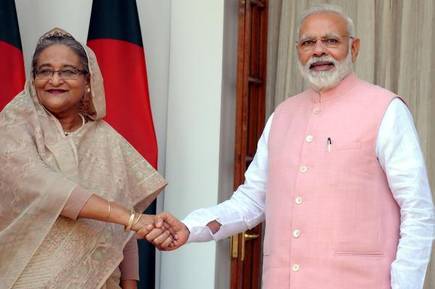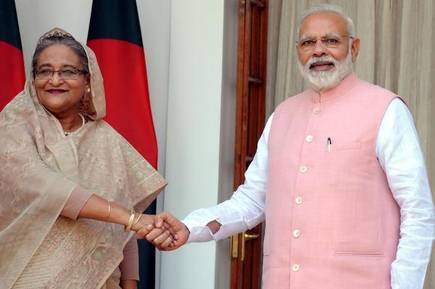By Avinash Paliwal (15 February 2021) – The relationship is robust, thanks to Sheikh Hasina. But to rely only on the skills of one leader may not be enough
A tri-service military contingent from Bangladesh participated in India’s 72nd Republic Day parade. Given the importance of the occasion, and the fact that 2021 is the 50th anniversary year of Bangladesh’s liberation, the signal of an “irreversible partnership” is unmissable.
When viewed in conjunction with the recent visual summit between Prime Ministers Narendra Modi and Sheikh Hasina, sustained high-level visits by top diplomats, signing of seven Memorandums of Understanding, restoration of the Haldibari-Chilahati railway line that was severed in 1965, a joint celebration of “Bangabandhu” Sheikh Mujibur Rahman’s legacy along with Mahatma Gandhi in a digital exhibition, and Modi’s planned visit to Dhaka in March, it becomes clear that this relationship is on stable ground.
But with the historically cyclical nature of this relationship — on an upswing when Hasina’s Awami League is in power, and a downswing with the Bangladesh Nationalist Party (BNP) — how long will this bonhomie last? As the military coup in Myanmar shows, civilian power cannot be taken for granted in countries with chequered civil-military relations. The current stability offers an opportunity to take a hard look at the structural risks the India-Bangladesh relationship faces.
Competition between religious and secular nationalisms in both countries is a powerful conditioning factor. This manifests in politically charged debates and violence around the issue of cross-border migration in India’s Northeast, and pervasive anti-India sentiment inside Bangladesh.
India’s recent push to redefine citizenship along religious lines required proactive diplomatic management in Dhaka. As Bangladesh’s foreign secretary recently stated, there is “no immediate reason” for Dhaka to be concerned about the Citizenship (Amendment) Act-National Register of Citizens issue. He was careful not to give the impression that the issue is settled for good.
Recent calls in India to support Hindu enclaves in Bangladesh is another sensitive issue with a historical precedent — witnessed in the demand for “Bangabhumi” by Bangladeshi Hindu separatists allegedly operating from Indian soil till the mid-2000s. This doesn’t bode well in the long-term either, even if such calls don’t have official sanction.
Power asymmetry between the two countries, India’s diplomatic assurances, and Hasina’s historically pro-India tilt mean that Dhaka has decided to overlook these issues. But they feed into the often violent Islamist-versus-secular nationalist debate within Bangladesh. Despite the Awami League’s secular attractiveness for India, the party has struggled to deal with Islamists. In recent years, it has conceded ground to Hefazat-e-Islam — an Islamist umbrella organisation that rose to prominence in 2013.
Another issue is Bangladesh’s increasingly one-party character under Hasina. This has enabled efficient decision-making as witnessed in Bangladesh’s economic success and effective management of big power rivalries. In the process, Hasina has neutralised the BNP and co-opted the military. But such moves create pockets of enduring resistance as the Islamists retain street power, and jihadist militancy refuses to die out.
There is an ever-present risk of such violence percolating into India. This is witnessed in, among other cases, the recent arrests of Jamaat-ul-Mujahideen Bangladesh radicals in Assam. Couple this with the fragile, tragic, and exploitable (by the jihadists) humanitarian situation of the Rohingyas, and the picture looks bleaker.
As India supports the revival of Mujib’s legacy, it will be useful to revisit the circumstances around his assassination in 1975. Increasingly embattled and authoritarian, Mujib — despite his pro-India, secular, and socialist credentials — failed to reconcile the country’s socio-political cleavages, leading to a violent pushback. Contrary to Indian expectations, popular reactions to the event were markedly lukewarm.
Mujib’s privileging of personal loyalty over professional institutions created foreseeable problems. Declassified documents demonstrate India’s frustration over its inability to secure the “hardcore” of pro-India elements and help Mujib better manage internal conflicts.
But what stands out is a paramount concern about another wave of forced migration, and the loss of Bangladesh to Pakistan less than four years after liberation.
Unlike India, where a change of government doesn’t alter New Delhi’s calculus vis-à-vis Bangladesh, the reverse is not true. Ziaur Rahman, who came to power in 1975 and formed the BNP in 1978, never got along with India. Neither did his wife, Khaleda Zia, who led the BNP ever since Zia’s assassination in 1981. A dip in Hasina’s political fortunes or personal health, then, risks undermining India’s interests.
In this context, China’s promise of big finance (being resisted by Dhaka for now,) and its role in curating a thaw between Dhaka and Islamabad, should give India pause. To rely on the existence, skills, and charisma of a single leader might put India in a difficult situation in a future political crisis. If the BNP succeeds in reviving itself before the 2024 elections by mobilising Islamists and military officers disillusioned with Hasina — with Beijing and Islamabad’s support — that might complicate India’s Hasina-centric strategy.
To be clear, India must continue supporting Hasina. But it should undertake a sustained mass outreach and political diversification in Bangladesh, including with moderate religious formations. The aim should be to develop something akin to a bipartisan consensus in Dhaka wherein all parties agree that good relations with India are their national interest.
Avinash Paliwal teaches at SOAS, University of London and is the author of My Enemy’s Enemy: India in Afghanistan from the Soviet Invasion to the US Withdrawal
The views expressed are personal . This article first appeared in The Hindustan Times.


